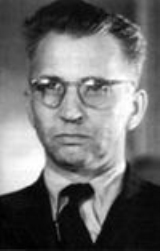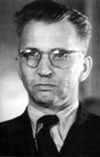
Leopold Okulicki
Encyclopedia

Nazi Germany
Nazi Germany , also known as the Third Reich , but officially called German Reich from 1933 to 1943 and Greater German Reich from 26 June 1943 onward, is the name commonly used to refer to the state of Germany from 1933 to 1945, when it was a totalitarian dictatorship ruled by...
underground Home Army during World War II
World War II
World War II, or the Second World War , was a global conflict lasting from 1939 to 1945, involving most of the world's nations—including all of the great powers—eventually forming two opposing military alliances: the Allies and the Axis...
. He was murdered after the war by the Soviet NKVD
NKVD
The People's Commissariat for Internal Affairs was the public and secret police organization of the Soviet Union that directly executed the rule of power of the Soviets, including political repression, during the era of Joseph Stalin....
.
Early life
Okulicki was born in November 1898 in BratuciceBratucice
Bratucice is a village in the administrative district of Gmina Rzezawa, within Bochnia County, Lesser Poland Voivodeship, in southern Poland. It lies approximately north of Rzezawa, north-east of Bochnia, and east of the regional capital Kraków....
, Bochnia County
Bochnia County
Bochnia County is a unit of territorial administration and local government in Lesser Poland Voivodeship, southern Poland. It came into being on January 1, 1999, as a result of the Polish local government reforms passed in 1998. Its administrative seat and largest town is Bochnia, which lies ...
in the Austria
Austria
Austria , officially the Republic of Austria , is a landlocked country of roughly 8.4 million people in Central Europe. It is bordered by the Czech Republic and Germany to the north, Slovakia and Hungary to the east, Slovenia and Italy to the south, and Switzerland and Liechtenstein to the...
n section of partitioned Poland
Poland
Poland , officially the Republic of Poland , is a country in Central Europe bordered by Germany to the west; the Czech Republic and Slovakia to the south; Ukraine, Belarus and Lithuania to the east; and the Baltic Sea and Kaliningrad Oblast, a Russian exclave, to the north...
("Galicia"). His exact date of birth is unknown as the birth record was not preserved in Polish archives and Okulicki himself used two dates: 11 November and 13 November. In 1910 he joined a local gymnasium
Gymnasium (school)
A gymnasium is a type of school providing secondary education in some parts of Europe, comparable to English grammar schools or sixth form colleges and U.S. college preparatory high schools. The word γυμνάσιον was used in Ancient Greece, meaning a locality for both physical and intellectual...
, and after 1913 he was also an active member of the Związek Strzelecki
Zwiazek Strzelecki
Związek Strzelecki "Strzelec" was a Polish paramilitary cultural and educational organization created in 1910 in Lwów as a legal front of Związek Walki Czynnej, and revived in Poland in 1991....
. The following year, at the age of 16, after finishing basic military training, Okulicki passed his NCO
Non-commissioned officer
A non-commissioned officer , called a sub-officer in some countries, is a military officer who has not been given a commission...
exams. After the outbreak of World War I
World War I
World War I , which was predominantly called the World War or the Great War from its occurrence until 1939, and the First World War or World War I thereafter, was a major war centred in Europe that began on 28 July 1914 and lasted until 11 November 1918...
, in October 1915, he left school and volunteered for the Polish Legions
Polish Legions in World War I
Polish Legions was the name of Polish armed forces created in August 1914 in Galicia. Thanks to the efforts of KSSN and the Polish members of the Austrian parliament, the unit became an independent formation of the Austro-Hungarian Army...
, where he served with distinction in the 3rd Legions Infantry Regiment.
He remained in the Polish Army and fought in various units both during the Great War and the following Polish-Bolshevik War. In the interwar period
Interwar period
Interwar period can refer to any period between two wars. The Interbellum is understood to be the period between the end of the Great War or First World War and the beginning of the Second World War in Europe....
he remained in the army and in 1925 graduated from the prestigious Warsaw Military Academy. Afterwards Okulicki took a post in Grodno local corps headquarters. Until late 1930s he taught at the Infantry Training Centre in Rembertów
Rembertów
Rembertów is a district of the city of Warsaw, the capital of Poland. Between 1939 and 1957 Rembertów was a separate town, after which it was incorporated as part of the borough of Praga Południe. Between 1994 and 2002 it formed a separate commune of Warszawa-Rembertów...
, and became commanding officer of Polish 13th Infantry Division.
Nazi occupation
In 1939 he was made commander of one of the departments of the Polish Commander-in-Chief's Headquarters. After Edward Rydz-Śmigły evacuated his staff from Warsaw, Okulicki remained in the Polish capital and served in various posts during the Siege of WarsawSiege of Warsaw (1939)
The 1939 Battle of Warsaw was fought between the Polish Warsaw Army garrisoned and entrenched in the capital of Poland and the German Army...
. After the capitulation of the Polish troops defending the capital, Okulicki evaded capture by the Germans and joined Służba Zwycięstwu Polski, one of the first underground resistance organizations formed in Nazi- and Soviet-occupied Poland. In January 1940 he moved to Łódź, where he assumed the post of commander of the local area of that organization. After a brief stint at Headquarters, he was transferred to Soviet-occupied Lwów and became head of that area.
Soviet period
Arrested by the NKVDNKVD
The People's Commissariat for Internal Affairs was the public and secret police organization of the Soviet Union that directly executed the rule of power of the Soviets, including political repression, during the era of Joseph Stalin....
in January 1941, he was imprisoned and tortured in various Soviet prisons. Released after the Sikorski-Mayski Agreement
Sikorski-Mayski Agreement
The Sikorski–Mayski Agreement was a treaty between the Soviet Union and Poland signed in London on 30 July 1941. Its name was coined after the two most notable signatories: Polish Prime Minister Władysław Sikorski and Soviet Ambassador to the United Kingdom Ivan Mayski.- Details :After signing...
of 1941, he joined the Polish Army re-created in the USSR, where he assumed the post of the chief of staff. After a brief period as the commanding officer of the Polish 7th Infantry Division
Polish 7th Infantry Division
The 7th Infantry Division was the name of several units of the Polish Army.The original division was formed in 1918 and took part in shielding the Polish borders during the Polish-Ukrainian War. During the Polish-Bolshevik War it was commanded by Col. Szubert and reinforced to three brigades...
he was moved to London
London
London is the capital city of :England and the :United Kingdom, the largest metropolitan area in the United Kingdom, and the largest urban zone in the European Union by most measures. Located on the River Thames, London has been a major settlement for two millennia, its history going back to its...
for training in the Cichociemni
Cichociemni
Cichociemni were elite special-operations paratroops of the Polish Home Army of the Polish Army in exile, created in Great Britain during World War II to operate in occupied Poland.-The name:...
training camp and then transported to occupied Poland. In July 1944, during Operation Tempest
Operation Tempest
Operation Tempest was a series of uprisings conducted during World War II by the Polish Home Army , the dominant force in the Polish resistance....
, he became the commander of the 2nd Echelon of the Home Army. General Bór-Komorowski, predicting his arrest by the Soviets after the Warsaw Uprising
Warsaw Uprising
The Warsaw Uprising was a major World War II operation by the Polish resistance Home Army , to liberate Warsaw from Nazi Germany. The rebellion was timed to coincide with the Soviet Union's Red Army approaching the eastern suburbs of the city and the retreat of German forces...
named him his deputy and successor. Okulicki fought in the Uprising, among other posts as the chief of staff of the Home Army. After the capitulation of the Uprising, he managed to evade being captured by the Germans and moved to Kraków, from where he started to reorganize the Home Army. On 3 October 1944 he became the commander of the entire organization. After the Soviet take-over of Poland, on 19 January 1945, he ordered the disbandment of the Home Army, fearing that future existence of an allied force in Poland would only lead to more people being murdered or arrested by the Soviets. Following an NKVD provocation, he was arrested and imprisoned in Moscow. Sentenced to 10 years in the staged Trial of the Sixteen
Trial of the Sixteen
The Trial of the Sixteen was a staged trial of 16 leaders of the Polish Underground State held by the Soviet Union in Moscow in 1945.-History:Some accounts say approaches were made in February with others saying March 1945...
, he was murdered on 24 December 1946 in Butyrka prison
Butyrka prison
Butyrka prison was the central transit prison in pre-Revolutionary Russia, located in Moscow.The first references to Butyrka prison may be traced back to the 17th century. The present prison building was erected in 1879 near the Butyrsk gate on the site of a prison-fortress which had been built...
.
According to him, “In comparison with the NKVD
NKVD
The People's Commissariat for Internal Affairs was the public and secret police organization of the Soviet Union that directly executed the rule of power of the Soviets, including political repression, during the era of Joseph Stalin....
, the Gestapo
Gestapo
The Gestapo was the official secret police of Nazi Germany. Beginning on 20 April 1934, it was under the administration of the SS leader Heinrich Himmler in his position as Chief of German Police...
methods are child's play.”
Decorations
- Order of the White Eagle, posthumously on 11 November 1995
- Order Virtuti Militari Golden Cross
- Order Virtuti Militari Silver Cross
- Cross of IndependenceCross of IndependenceCross of Independence was one of the highest Polish military decorations between World Wars I and II. It was awarded to individuals who had "fought heroically for the independence of Poland," and was released in three versions.- History :...
- Cross of Valour, 4 times
- Cross of Merit with Swords Golden Cross
- Legion of MeritLegion of MeritThe Legion of Merit is a military decoration of the United States armed forces that is awarded for exceptionally meritorious conduct in the performance of outstanding services and achievements...
, posthumously (USA)

